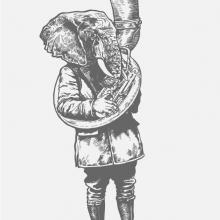Rick Santorum
"But I think everyone should be responsible and deal with the problems that we have to confront in our lives. And ignoring those problems and saying they're not going to come to me and saying some phony gun law is gonna solve it. Phony gun laws don't solve these problems."
He won 11 primaries in 2012 with his devoutly Catholic, homeschooling-dad culture-warrior campaign. On May 27, he declared for the 2016 race with his traditionalist moral views freshly sharpened.
Here are five faith facts about Santorum.
How many voters know that former Florida Gov. Jeb Bush is a Roman Catholic? Or that Texas Sen. Ted Cruz is a Southern Baptist, not a Latino Catholic? Or that Florida Sen. Marco Rubio worships at both a Catholic parish and an evangelical church?
More importantly, does it matter?
Actually, it does in today’s Republican Party, where a number of factors have forged a new religious identity that supersedes familiar old categories.
These prominent Republicans are emblematic of the new religious amalgam that, in many instances, has helped refashion denominational differences that were once almost insurmountable. Look no further than the stunning Virginia primary victory of Dave Brat, a Catholic with degrees from a Reformed Protestant college in Michigan and Princeton Theological Seminary, who took down House Majority Leader Eric Cantor last week.
It’s not the message you might expect to hear from Rick Santorum, the Christian-conservative former presidential candidate: Faith-based films tend to be lousy, and Christians should quit trying to lock modern popular culture out of their lives.
Instead, Santorum says, Christian conservatives should acknowledge that modern popular culture is here to stay, and use that platform to produce Christian-themed films that will also have quality and popular appeal. It’s a strategy he says he intends to pursue in his new role as CEO of a ground-breaking faith-based film studio.
In an interview here, Santorum also stood by his strong views against same-sex marriage, citing the necessity to adhere to religious teachings — but then disputed his own religion’s leaders on the issue of immigration.
Most of the first punditry around Rick Santorum suspending his quest for the Republican presidential nomination focuses on his drop in the Pennsylvania opinion polls and his difficulty in fundraising. Those were no doubt part of the decision. But there’s a deeper reason more important than political considerations.
As has been frequently reported, Sen. Santorum and his wife Karen’s youngest child Bella, was born with a rare and usually fatal chromosomal condition known as Trisomy 18. Bella, 3-years old, has been hospitalized twice already this year with pneumonia, most recently this past weekend. Santorum took two days from campaigning to be with her.
Rick Santorum, candidate for the Republican Presidential nomination, has ended his run for the GOP presidential nomination, he announced at a news conference from a hotel in Gettysburg, Pa., today (Tuesday).
Despite winning primary contests in 11 states, failure to win any of the three primaries last week in Wisconsin, Maryland and the District of Columbia heaped pressure on Santorum’s campaign.
Sen. Santorum, accompanied at the podium by his wife and several other family members, explained to journalists gathered at today’s press conference that the recent hospitalization of his young daughter Bella, who has a rare genetic disorder, had impacted his decision to end his campaign.
Does Rick Santorum's Southern surge also herald the return of the Religious Right?
Last January, the titans of Christian conservatism were widely dismissed as irrelevant, at best, after 150 of them gathered for an evangelical "conclave" at a Texas ranch and anointed Rick Santorum as their champion -- only to see him finish third in rock-ribbed South Carolina a week later, well behind Newt Gingrich and even their least-loved candidate, Mitt Romney.
Now, however, with Santorum on an roll after big primary wins on Tuesday (March 13) in Alabama and Mississippi, those born-again bigwigs and their allies may be having the last laugh.
"People have been writing the obituary of the pro-family, evangelical movement for 25 years -- and they're always wrong," said Ralph Reed, head of the Faith and Freedom Coalition and the architect of the Christian Coalition in the 1980s.
Last Friday, on his weekly show Real Time with Bill Maher, the not-so friendly atheist, Mr. Maher took issue with the Santorum families decision to homeschool their children. Here’s what he said:
"But I bring up the old tale of the poisoned apple — no, not "Snow White," that's a fairy tale — because the Adam and Eve story is taken literally by half the country and it's no coincidence that the type of tree which god forbade Adam and Eve eating from was the Tree of Knowledge. Rick Santorum homeschools his children because he does not want them eating that f--king apple. He wants them locked up in the Christian madrassa that is the family living room not out in public where they could be infected by the virus of reason. If you're a kid and the only adults you've ever met are mom and dad, and then they're also the smartest adults you've met, why not keep it that way? Why mess up paradise with a lot knowledge? After all, a mind is a terrible thing to open."
Santorum took exception to these comments. For good reason.
My parents made the decision to homeschool three out of four of their children at some point during our K-12 years. They invested both time and resources because they believed it was the best thing they could do for our development and education at that time.
In Tuesday’s Mississippi and Alabama primaries, about eight of 10 voters identified as evangelical, locking in victories for former Sen. Rick Santorum, and proving once again the importance of the evangelicals in the election.
Presidential hopefuls are again battling it out to be the God candidate, but the tide of the so-called “evangelical vote” seems ever-shifting. Santorum—a Catholic—is doing better to court most evangelicals, while former Massachusetts governor Mitt Romney — a Mormon — is beating out Santorum among Catholics. And according to a recent poll, Republicans in the Deep South are still questioning whether President Barack Obama is a Muslim.
Religion matters.
But what does the “evangelical vote” even mean anymore? And can any one candidate really claim it? Even with Santorum’s win Tuesday, a significant number still fell into Romney’s column — and that’s just among Republican evangelicals. Obama was able to draw some evangelical support in 2008 and could garner more in November.

"Meet the Millennials," photo by TheeErin/Wylio (http://bit.ly/yZ7ZF9).
There has been a lot of talk lately — both in the public sphere and most definitely here at the Sojo offices—about young people leaving the church.
I would argue that--while some of my fellow millenials are jumping ship on Christiainity--many are not so much leaving the big-C “Church,” (see my post on the definition of the word), as they are leaving established churches. The surveys show a migration from a particular denomination to “no religion.” To me, that doesn’t say atheist/agnostic; it just says that this generation of Christians doesn’t want to be labeled.
If you look at the numbers, millenials are quitting the church, not quitting Jesus. Unaffiliated does not necessarily mean unChristian.
My generation doesn’t want the “Southern Baptist,” “Wisconsin Evangelical Lutheran Synod,” “Roman Catholic” affiliations thrust upon us. Not only do we disagree with some of the tenants of said denominations, but each title carries all sorts of baggage left at our feet.
We’ve seen post after post listing possible catalysts to twenty-somethings turning away from the religion of our fathers in droves. Presidential hopeful Rick Santorum blames college. The reasons listed here on God’s Politics, in books and by church leaders themselves each probably factor in to some degree.
But I do want to dismiss some of them.
New analysis by the Pew Forum on Religion & Public Life, based on National Election Pool exit polling conducted during the Super Tuesday GOP primaries, shows that Mitt Romney continues to struggle among the GOP’s white born-again/evangelical voters. He did win the evangelical vote in two of the seven states where exit polling was conducted: Massachusetts (where he served as governor); and Virginia (where neither Santorum nor Gingrich were on the ballot). In four states, Romney received significantly less support from evangelicals than from non-evangelical voters — continuing the pattern seen in previous caucuses and primaries.
Strapped for cash and staff, Rick Santorum has enlisted a ragtag but politically potent army to keep his campaign afloat: home-schoolers.
Heading into today's Super Tuesday, Santorum was urging home-schoolers to organize rallies, post favorable features on social media and ring doorbells on his behalf.
"Santorum has been very aggressive in reaching out to the home-schooling community, especially in the last month," said Rebecca Keliher, the CEO and publisher of Home Educating Family Publishing.
Drawing on his experience as a home-schooling father of seven, the former Pennsylvania senator has also sought to rally enthusiasm by pledging to continue that course in the White House.
"It's a great sacrifice that my wife, Karen, and I have made to try to give what we think is the best possible opportunity for our children to be successful," Santorum said during a March 1 campaign stop in Georgia. "Not just economically, but in a whole lot of other areas that we think are important — virtue and character and spirituality."
Mitt Romney has trounced Rick Santorum, an ardent Catholic, among Catholic voters, but Romney's support among evangelicals has wavered thus far in the GOP presidential primary, according to a new analysis of exit poll data.
Though he won evangelicals in two states, in general Romney has performed 15 percentage points better among non-evangelicals, according to an analysis released March 2 by the Pew Forum on Religion & Public Life.
Exit poll data is available in seven of the 11 states that have held primary contests to date, according to the Pew Forum. More detailed religious affiliations are available in six of those states.
White evangelicals formed more than a third of all GOP primary voters in each state except for Nevada (24 percent) and New Hampshire (21 percent). Romney, a Mormon, won the evangelical vote in those two states, and nearly tied for first in Arizona and Florida. But he lost the evangelical vote badly in three states: Michigan, Iowa and South Carolina.
Somewhat surprisingly, Santorum has not won the Catholic vote in a single state in which data is available, according to the Pew Forum.
The unofficial results are in and it looks like former governor Mitt Romney won the Michigan primary with 41 percent of the vote. Many commentators believe that this win indicates a recovery of momentum for the Romney campaign.
There are now unconfirmed reports that building off the popularity of President Obama’s rendition of Al Green’s “Let’s Stay Together,” Mitt Romney has been working on a cover of Katy Perry’s "Hot n’ Cold" to sing for GOP primary voters.
Not to be outdone, Santorum, Gingrich, and Paul pull a few tricks from their sleeves too.
Christianity in America is in danger. As former Senator Rick Santorum recently pointed out, young people are leaving the church in droves.
In the mid-1980s, evangelical 20-somethings outnumbered those with no religious affiliation — the so-called “nones” — by a ratio of more than 2 to 1. By 2008, those proportions were almost flipped, with young “nones” outnumbering evangelicals by more than 1.5 to 1.
An entire generation, my generation, is leaving the church. What’s the cause? Santorum blames higher education, telling Glenn Beck last week that "62 percent of kids who go into college with a faith commitment leave without it."
The “war on religion” has become a frequent bogeyman among Christian and political leaders. But the reason church leaders have failed to stem the tide of a generation heading for the exit door is that they keep looking for an outside enemy to blame when the biggest problems are inside the church.
The years young adults spend in college aren’t causing them to leave their faith; those college years are exposing the problems with the faith they grew up with.
The exodus has little to do with liberal college professors, which insurance plans should cover contraception, where mosques are being built, or whether or not the Ten Commandments are hanging in courtrooms, even if many religious leaders act as if these are the greatest Christian “battles” of our lifetime.
GRAND RAPIDS, Mich. — Mitt Romney’s position on the Detroit auto bailout and health care plan have been blasted, but a pollster suggests one issue not often discussed on the campaign trail this year could end up costing him Tuesday's Michigan primary victory: his Mormon faith.
EPIC-MRA pollster Bernie Porn said the former Massachusetts governor’s faith hasn’t been as big of a topic as it was when he sought the nomination in 2008.
But Porn said on WGVU’s “West Michigan Week” that his polls show that 7 percent of the Republicans tallied said they wouldn’t vote for Romney because he is a Mormon – and the actual number might be higher.
With a race that could be decided by less than 5 percent, that could be a problem for Romney, he said.
Republican presidential hopeful Rick Santorum's claim that U.S. colleges drive young Christians out of church is facing scrutiny from Protestant and Catholic experts.
Santorum told talk show host Glenn Beck late last week that "62 percent of kids who go into college with a faith commitment leave without it." He also has called President Obama a "snob" for wanting more Americans to attend college.
"There is no statistical difference in the dropout rate among those who attended college and those that did not attend college," said Thom Rainer, president of the Southern Baptists' LifeWay Christian Resources research firm. "Going to college doesn't make you a religious dropout."
A 2007 LifeWay survey did find seven in 10 Protestants ages 18 to 30 who went to church regularly in high school said they quit attending by age 23.
The real causes: lack of "a robust faith," strongly committed parents and an essential church connection, Rainer said.
The Problem With Rick Santorum’s Holy War; Rick Santorum: 'If Government Is Going To Get Smaller, Then People Have To Get Bigger'; G.O.P. Campaigns Grow More Dependent On ‘Super PAC’ Aid; The Real Defense Budget; EU To Vote On Oil Sands Pollution; Christians Should Not Be Political Pacifists, Says Megachurch Pastor; Latino Mormons Speaking Out Against Romney Over Immigration Issue; Training Afghani Imams To End Violence Against Women (OPINION); Franklin Graham: Obama May Secretly Be A Muslim, Santorum And Gingrich Are Definitely Christian.
Does theology matter when it comes to evaluating political leaders? How does this whole faith and politics thing work?
Both Barack Obama and Rick Santorum have strong records on supporting legislation and funding policies that fight global poverty and pandemic diseases. Both men have talked about how their concern for the poor is motivated by their faith.
I feel comfortable with that and I think most people do. It is an example of political figures expressing their personal motivation behind widely held values that aren’t exclusive to a particular religious tradition.
There are some religious beliefs, such as a particular stance on infant baptism, understanding of the Trinity, or belief in what occurs when Christians observe the Lord’s Supper that are significant theological claims. But they aren’t good or appropriate benchmarks by which to evaluate political candidates.















